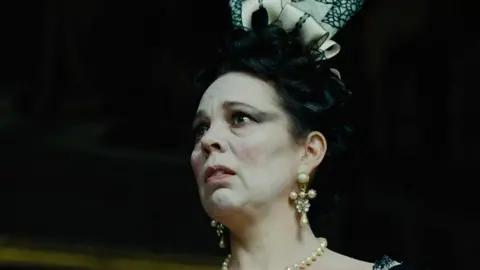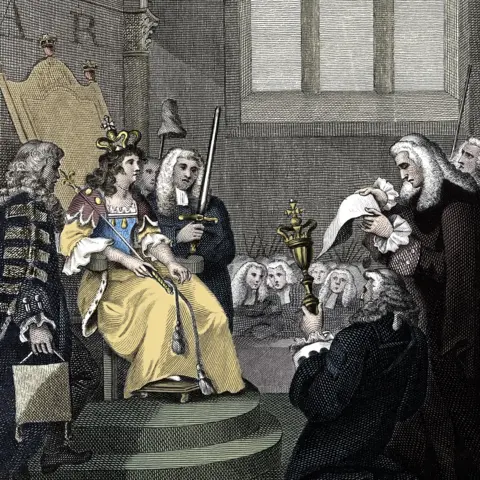The Favourite: Who was Queen Anne, played by Olivia Colman?
 Fox Searchlight Pictures
Fox Searchlight PicturesBritish actress Olivia Colman has been honoured at the Golden Globes for her portrayal of Queen Anne in The Favourite - but who was the subject of the acclaimed film?
Despite what the film says, Queen Anne did not have a menagerie of 17 bunnies.
And no - there is no evidence that she was in a same-sex relationship.
However, the film does shed light on a British monarch often overlooked by history.
Why was she important?
Queen Anne's relatively short reign (1702-1714) is often seen as a blip in history.
That's a mistake, says Sebastian Edwards, a Historic Royal Palaces curator who is part of the team overseeing a new exhibition of costumes from The Favourite at Kensington Palace.
"She cleared up the mess left by the men and doesn't get much thanks or credit for it," he says (Anne's father, James II and VII of Scotland, was king for three years before being deposed in the Glorious Revolution of 1688).
"If you're looking for strong female leaders you couldn't find a better one in a time of crisis."
Anne became queen following the death of William III (and II in Scotland), also known as William of Orange, who succeeded Anne's father as king.
Her reign saw the unification of Scotland and England, Britain taking possession of Gibraltar, and the development of the two-party system.
Despite at least 17 pregnancies, none of her children survived into adulthood, which led to the end of the House of Stuart, the Act of Settlement of 1701, and the peaceful transition of power to the House of Hanover.
She was succeeded by the German Protestant prince George, Elector of Hanover (George I).
Hannah Greig, the historical adviser for the film, says the film accurately "captures the essence of the politics of the time" with Whigs and Tories competing for power.
"It reveals to us the tensions that were evident over whether or not England should continue its place in the European war," says Dr Greig, who works at the University of York.
 Getty Images
Getty Images
Was she gay?
In the film, Queen Anne has two female lovers: Sarah Churchill, Duchess of Marlborough, and Abigail Masham, Baroness Masham.
Mr Edwards says that - despite rumours of Anne being gay - there is no firm evidence.
Dr Greig is less certain. She believes it is not as far-fetched as some might presume.
What about the bunnies?
In the film the queen has 17 pet bunnies, which Dr Greig says, represent Anne's 17 miscarriages, stillbirths and dead children.
For Dr Greig, the bunnies are an emotional representation of this - and a clever way of conveying her personal history.
The queen also suffered from ill-health through her life which is often depicted as gout.
However, Mr Edwards says that it's more complex - today she would be thought of as disabled, he says.
Why isn't she better known?
Blame her former friend and confidante Sarah Churchill, the Duchess of Marlborough, says Dr Greig.
According to the film's adviser, she "went out of her way to try and spin history and sully the past".
Why? We don't really know - but politics was probably a contributing factor.
Dr Greig says it was the the Duchess of Marlborough's ambition to make the court (the royal household and advisers) a political place - but Queen Anne wanted a more balanced court where all parties were represented.
And what does Olivia Colman think of her?
In one interview, Colman said she sympathised with Queen Anne. "There's so much sadness in her background, she must have been terribly lonely," she said.
Colman said she found it harder to play current monarch, Queen Elizabeth II, in Netflix series The Crown, because "everyone knows what she looks like, everyone knows what she sounds like".
But she said she was "proud" of the 18th Century Monarch she is bringing to life for 21st Century audiences. "She must have had extraordinary strength," she said.
"I think she wanted to be seen as a good queen but she just didn't have the confidence to do it. I never saw her as pathetic. I'm quite proud of her."
